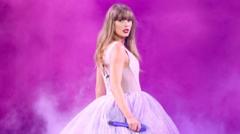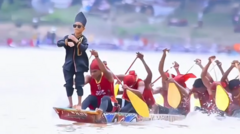Following the controversial annulment of Romania’s presidential elections, a spotlight has turned on TikTok influences accused of manipulating the outcome. With far-right candidate Calin Georgescu detained amid allegations of a Russian-backed disinformation campaign, the focus now lies on the complex interplay between social media tactics and traditional politics as the country prepares for another election.
TikTok's Role in Romania's Election Controversy Raises Questions Amid Political Turmoil

TikTok's Role in Romania's Election Controversy Raises Questions Amid Political Turmoil
As Romania heads to the polls again, a scandal involving TikTok influencers and alleged foreign interference looms large over the elections, creating divisions among voters and authorities.
As Romania approaches a crucial re-run of its presidential elections this weekend, the political landscape remains fraught with turmoil stemming from the shocking annulment of the December elections. The initial results led to widespread protests after far-right candidate Calin Georgescu, previously polling under 5%, surged to win almost 23% of the vote through unexpected social media tactics. Allegations of Russian interference and the use of dubious TikTok accounts have complicated the situation further, with accusations flying against influencers who might have impacted public sentiment.
Georgescu is currently barred from participating in the upcoming elections and faces serious criminal charges, including an alleged attempt to overthrow the constitutional order, which he denies, labeling the accusations as fabrications to justify election manipulation. In the meantime, George Simion, leader of the far-right AUR party, is leading in polls for the re-run elections, with Crin Antonescu and Nicușor Dan also in contention.
The role of TikTok in the elections has come under scrutiny, as Romanian authorities accuse various influencers of boosting Georgescu's candidacy through orchestrated campaigns. An independent report by think tank Expert Forum claimed that Georgescu's rapid rise was artificially constructed, with over 100 influencers allegedly paid to promote him indirectly, alongside a proliferation of inauthentic accounts that intensified his visibility on the platform.
While TikTok has taken steps to remove fake accounts and has claimed a proactive stance in managing content, concerns linger over the method's validity and potential foreign influence, especially as declassified intelligence points to cyber activities by Russia. However, Romanian authorities are yet to provide solid evidence of direct Russian entanglement, leaving many citizens frustrated by the lack of transparency.
Influencers implicated in the controversy professed unclear knowledge of the financial motivations behind their campaigns. Some expressed confusion about their involvement, stating that they were merely encouraging voter participation rather than supporting a specific candidate. The hashtags that gained traction on TikTok appeared neutral but were later linked to the National Liberal Party, which alleged that their planned campaign was overtaken to assist Georgescu.
The unfolding narrative took another twist with the arrest of Bogdan Peschir, nicknamed the "King of TikTok," who is accused of corrupting voters by incentivizing them through financial gifts on TikTok. However, discussions surrounding the payments largely remained subjective, with supporters asserting that the funds were unrelated to political promotion.
As the parliamentary elections near, investigations into the influence operations continue, with many Romanians expressing disillusionment over the electoral legitimacy following the scandal. The ongoing ambiguity regarding actual foreign interference is a pressing concern. Razvan Lutac, Editor of the news outlet Snoop, notes the painstaking process of piecing together the complexities at play, suggesting that clarity might only emerge much later. The situation highlights the evolving intersection between social media, politics, and voter engagement in contemporary electoral landscapes.





















